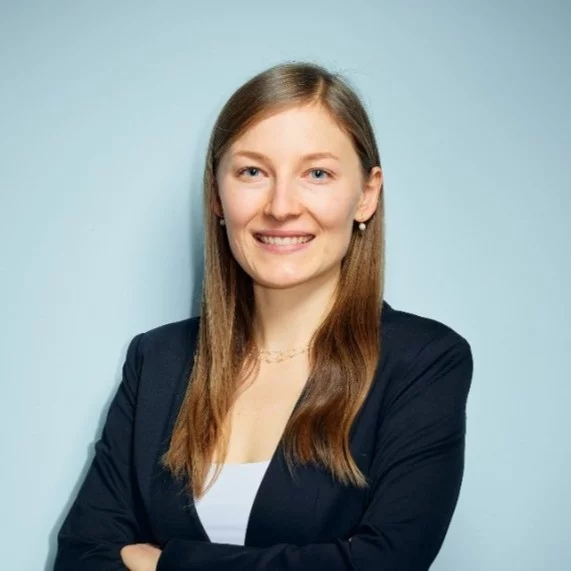The PSI Career Blog features PSI alumni and their career paths to highlight the versatility of the PSI community, and inspire the young generation. Today with Kathrin Ebner, who is telling us about her journey from a PhD at PSI to being a risk assessor at Munich Re.
What was your role at PSI, and which division were you part of?
I was a graduate researcher in the ENE division’s Laboratory for Electrochemistry. My work focused on the characterization of electrocatalysts for the oxygen reduction reaction, which takes place in a hydrogen fuel cell for example.
What are you doing now and where are you working?
After my time at PSI, I spent a few years at a research institute – first as a postdoc, later as a competence domain lead and strategic research coordinator. My passion and interest for electrochemical energy conversion and storage – both in the context of energy carriers like green hydrogen and in propulsion applications – never faded. On the contrary, just recently, I took on a new role at Munich Re’s Emerging Green Tech Solutions team, which again centres around these topics. Specifically, I work in risk assessment and due diligence for electrochemical technologies in hydrogen and e-mobility, i.e. electrolyzers, fuel cells and batteries. In practice that means that I take a very detailed look at the performance of the device, its structure and components, associated aging processes and failure modes. Furthermore, by means of production site visits I evaluate its manufacturing. All of this is a critical step in enabling insuring these technologies, or in other words transferring the related risks. This paves the way for investors to invest in emerging technologies that are key for the transformation to a net-zero economy. To that end, electrification and renewably produced energy carriers such as green hydrogen are considered key pillars to achieve emission reduction in order to accomplish the targets set in the Paris Agreement.
What does your typical workday look like?
I wouldn’t say that there is such a thing – everyday is different, which is what I love. Overall, it is a good mix of data-based work, topical discussions with clients and colleagues and travelling. Importantly, I also spend time on educating myself about latest developments in the field to make sure to be continuously equipped with up-to-date expertise, which is of course key to assessing emerging technologies.
What do you like particularly about your job?
The interdisciplinarity of my team. It is my firm belief that building a shared understanding of terminology, fundamental principles and, most importantly, relevant challenges builds the foundation of excellent ideas and progress.
How did you manage the transition into your new role? What was different, what was similar, what may have surprised you?
From my perspective, the transition went surprisingly smoothly. Why do I say surprisingly? Well, to be honest I was quite hesitant to step out of my research “comfort zone”, but I soon learned that also my new role requires lots of hard skills, sector knowledge and passion for electrochemistry – all things I enjoy. Furthermore, there is room to grow and learn; just like there is in academia. 😊
Which of the skills learned at PSI help you in your new role?
On the one hand, I am very thankful for the excellent topical education that I received at PSI and ETH. I continuously build on this strong foundation in electrochemistry, material characterization and device testing and I can’t remember a workday going by without using this knowledge and trying my best to expand it.
On the other hand, my roles in PSI’s PhD and Postdoc Association and the Green Team not only provided a good balance to all the lab and computer work, but also taught me a lot on agile team structures, hands on organization and management skills and advocating for yourself and your peer group. All of those are transferrable skills definitely relevant to most jobs in the field.
Is there anything you miss now that you are no longer at PSI?
As with any work place it is mostly the former colleagues, whom I miss. Lots of great memories of barbeques, christmas parties, coffee sessions and, last but definitely not least, cakes at midnight during beamtimes were made at PSI. Other than that, I also miss the vast technical expertise on basically any of my interest topics, which was always just a few steps (and maybe a bridge crossing) away – everyone I encountered was always willing to discuss and learn from each other providing an extremely motivating and fruitful environment for research.
